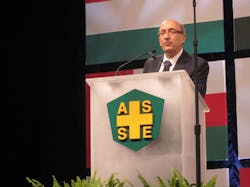Safety 2014: OSHA Focusing on Protecting Temporary Workers
In late June, OSHA handed out $135,200 in fines to a Texas vegetable processor and its staffing agency for exposing temporary workers to dangerous noise levels, toxic chemicals and other alleged hazards.
Earlier in the month, the agency issued $40,600 in fines to California Cereal Products Inc., alleging that the cereal maker exposed full-time and temporary workers to electrical, fall and noise hazards at its Macon, Ga., facility.
Also in June, OSHA cited five companies – including four staffing agencies – for alleged safety violations that led to the death of a temporary worker at an Amazon fulfillment center in Avenel, N.J.
OSHA’s recent enforcement actions underscore comments made by Dr. David Michaels at ASSE’s 2014 Professional Development Conference and Expo in Orlando, Fla.: The agency is cracking down on employers and staffing agencies that fail to protect temporary workers from safety hazards.
“The fastest-growing sector in the economy is temporary work,” Michaels told Safety 2014 attendees. “At the worst of the recession, the temporary jobs were disappearing. Now with the economy coming back, temporary work is going gangbusters.”
Here’s the problem: Temporary workers are far more likely to be hurt on the job than their more experienced, full-time counterparts, for a number of reasons. According to the Bureau of Labor Statistics, 708 (16 percent) of the 4,383 workplace fatalities in 2012 involved contractors and temporary workers.
“We’ve known for 100 years that new workers are three or four times more likely to be injured or killed on the job than workers who have a year of seniority,” Michaels said. “We know that temporary workers are new at a workplace four, five, six times a year – they’re always new workers. We also know that they’re often given the most hazardous jobs. And finally, we know that host employers are less likely to devote resources to train them.”
Michaels emphasized that OSHA requires employers to ensure the safety and health of all workers, including temporary employees.
“And we look at the host employer and the staffing agency as joint employers,” Michaels said. “They’re both responsible for protecting [temporary] workers.”
In April 2013, OSHA launched a campaign aiming to improve workplace safety and health for temporary workers.
One of the campaign’s key messages is that “each employer should consider the hazards it is in a position to prevent and correct, and in a position to comply with OSHA standards.”
“For example: Staffing agencies might provide general safety and health training, and host employers provide specific training tailored to the particular workplace equipment/hazards,” OSHA explains on its temporary-worker Web page.
Another key issue, Michaels told Safety 2014 attendees, is that employers must provide training “in the language and vocabulary that workers understand.”
“Too often we’re in situations where we’ll ask the employer why they didn’t provide training, and they’ll tell us that the worker didn’t speak English,” Michaels said. “If you hire a worker, they have to be trained in the vocabulary and language they understand.”
As part of OSHA’s initiative to protect temporary workers, the agency in May formed an alliance with the American Staffing Association. Through the alliance, OSHA and the association plan to educate workers about their rights, and educate staffing firms and their clients on their responsibilities to protect temporary workers.
With the increased reliance on temporary workers in the economy, there’s been an uptick in what Michaels calls “first-day fatalities.” The example that Michaels frequently uses is that of Lawrence “Day” Davis, a 20-year-old temporary worker who was killed on his first day on the job at a Bacardi Bottling Corp. facility in Jacksonville, Fla.
OSHA hit Bacardi with $192,000 in fines after the fatality, and Michaels pointed out that other employers have taken notice. When an OSHA inspector visited a steel mill earlier this summer, the inspector came upon a whiteboard with this message: “Safety: Temps also must be trained on hazards specific to workplace before starting, OSHA Bacardi $192,000 fine.”
“We would prefer to make our impact before a worker is hurt or killed,” Michaels added.
